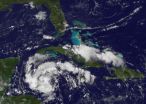Watercress may 'turn off' breast cancer signal
2010-09-14
(Press-News.org) The research, unveiled at a press conference today (14 September 2010), shows that the watercress compound is able to interfere with the function of a protein which plays a critical role in cancer development.
As tumours develop they rapidly outgrow their existing blood supply so they send out signals which make surrounding normal tissues grow new blood vessels into the tumour which feed them oxygen and nutrients.
The research, led by Professor Graham Packham of the University of Southampton, shows that the plant compound (called phenylethyl isothiocyanate) found in watercress can block this process, by interfering with and 'turning off' in the function of a protein called Hypoxia Inducible Factor (HIF).
Professor Packham, a molecular oncologist at the University of Southampton, comments: "The research takes an important step towards understanding the potential health benefits of this crop since it shows that eating watercress may interfere with a pathway that has already been tightly linked to cancer development.
"Knowing the risk factors for cancer is a key goal and studies on diet are an important part of this. However, relatively little work is being performed in the UK on the links between the foods we eat and cancer development."
Working with Barbara Parry, Senior Research Dietician at the Winchester and Andover Breast Unit, Professor Packham performed a pilot study in which a small group of breast cancer survivors, underwent a period of fasting before eating 80g of watercress (a cereal bowl full) and then providing a series of blood samples over the next 24 hours.
The research team was able to detect significant levels of the plant compound PEITC in the blood of the participants following the watercress meal, and most importantly, could show that the function of the protein HIF was also measurably affected in the blood cells of the women.
The two studies, which have been published in the British Journal of Nutrition and Biochemical Pharmacology, provide new insight into the potential anti-cancer effects of watercress, although more work still needs to be done to determine the direct impact watercress has on decreasing cancer risk.
Watercress Alliance member Dr Steve Rothwell says: "We are very excited by the outcome of Professor Packham's work, which builds on the body of research which supports the idea that watercress may have an important role to play in limiting cancer development."
INFORMATION:
A summary of the research has been accepted for inclusion in the Breast Cancer Research Conference which is taking place in Nottingham from 15 to 17 September.
Breast cancer is the most common cancer in women in the western world and currently affects approximately 1 in 9 women during their lifetime.
ELSE PRESS RELEASES FROM THIS DATE:
2010-09-14
(PHILADELPHIA) An abrupt, fatal heart attack in a young athlete on the playing field is a tragedy destined to repeat itself over and over until more is understood about hypertrophic cardiomyopathy (HCM), a genetic disorder that is the most common cause of sudden death in young people but which affects people of all ages. So says a task force of cardiologists and cardiac biologists, headed by Thomas L. Force, M.D., James C. Wilson Professor of Medicine at Thomas Jefferson University, in the September 14th online edition of the journal Circulation.
Their special report ...
2010-09-14
Scientists have for the first time estimated the physical footprint of human activities on the deep seafloor of the North East Atlantic. The findings published in the journal PLoS ONE reveal that the area disturbed by bottom trawling commercial fishing fleets exceeds the combined physical footprint of other major human activities considered.
The deep seafloor covers approximately 60% of Earth's surface, but only a tiny fraction of it has been studied to date. Yet as technology advances and resources from relatively shallow marine environments are depleted, human impacts ...
2010-09-14
Global fisheries, a vital source of food and revenue throughout the world, contribute between US$225-$240 billion per year to the worldwide economy, according to four new studies released today. Researchers also concluded that healthier fisheries could have prevented malnourishment in nearly 20 million people in poorer countries.
This first comprehensive, peer-reviewed estimate of the global economic contribution of fisheries was published online today in four papers as part of a special issue of the Journal of Bioeconomics.
This research, conducted by the University ...
2010-09-14
GOES-13 captured a look at System 92L this morning as it continues moving through the central Caribbean, and it's looking more and more like a tropical depression.
As the Geostationary Operational Environmental Satellite called GOES-13 satellite keeps relaying data to NOAA (who manages the satellite) and the NASA GOES Project at NASA's Goddard Space Flight Center in Greenbelt, Md., the images created by the NASA GOES Project reveal that System 92L appears to be taking on the appearance of a tropical depression. In the imagery captured today, Sept. 14 at 1340 UTC (9:40 ...
2010-09-14
ROCKVILLE, Maryland, September 14, 2010 – Neuralstem, Inc. (NYSE Amex: CUR) announced that its spinal cord stem cells survived in rat brains affected by stroke and differentiated predominantly into neurons. The transplanted animals showed significant improvement in some motor skill and strength measurements. The study entitled, "Intracerebral Implantation of Adherent Human Neural Stem Cells To Reverse Motor Deficits in Chronic Stroke Rats," was presented earlier today by senior study author, Dr. Shinn-Zong Lin, M.D., Ph.D., at the Stem Cells USA & Regenerative Medicine ...
2010-09-14
An astronomer may have caught a cannibalistic star in the act of devouring a companion and making a second generation of exoplanets from the resulting orbiting disk.
Using data from NASA's Chandra X-ray Observatory, Joel Kastner, professor at Rochester Institute of Technology, has found evidence that a variable star in the constellation of Pisces, BP Piscium, is not the young star it appears to be, but is more likely a one billion-year-old red giant that has gobbled up a star or planet in its vicinity.
The star's extreme properties have puzzled astronomers since Kastner ...
2010-09-14
"The IFFS's 'Surveillance 2010' report, compiled by Professor Ian Cooke and published on 14 September 2010, illustrates this for over 100 countries. The survey highlights how widely assisted reproductive technologies (ART) are being used and how different cultures are regulating services in different ways. In most countries there is no state or insurance support, so these services are costly and frequently beyond the reach of many families. In some countries access to donor gametes is denied or supply is limited.
To address the safety of patients that seek treatment abroad, ...
2010-09-14
Low Adherence with Regular Fecal Occult Blood Test Screening Among Insured Patients
In a large U.S. health plan, nearly one-half of patients who initiated biennial fecal occult blood test (FOBT) screening did not adhere to subsequent colorectal screening in the ensuing 2-year period, compromising the effectiveness of the screening endeavor which hinges on regular screening. Analyzing data on 11,110 patients enrolled in a Washington State health plan who completed an FOBT during the baseline period (2000-2001), researchers found 47 percent received no colorectal screening ...
2010-09-14
Farming practices have a significant impact on the diversity of beneficial microbial fungi known to play important roles in crop productivity, soil recovery and maintenance of healthy ecosystems, according to new research published today (14 September 2010) in the journal Environmental Microbiology. The conclusions could have important implications for the way humans manage the agricultural landscape and tackle food security issues.
The study was led by Dr Christopher van der Gast at the Centre for Ecology & Hydrology (CEH), UK and Dr Gary Bending from the University ...
2010-09-14
A medicine widely used to treat attention-deficit/hyperactivity disorder (ADHD) also provides long-term relief from the attention and behavior changes that affect many childhood cancer survivors, according to a multicenter trial led by St. Jude Children's Research Hospital investigators.
Researchers reported that one year after starting the drug methylphenidate, young cancer survivors scored better on tests of sustained attention and other measures of attention, social skills and behavior than did a similar group of unmedicated survivors. While taking methylphenidate, ...
LAST 30 PRESS RELEASES:
[Press-News.org] Watercress may 'turn off' breast cancer signal


